Announcing our scholarship winners is one of the highlights of the year for all of us here at Floret. We always get inspired by the many stories from around the globe from people who want to cultivate beauty in their lives and communities. What was even more impressive this year was the level of commitment by so many applicants to continue to pay it forward and help others along the way.
This was another record-breaking year for our scholarship program. We received close to 4,000 applications from 79 different countries around the world. I loved seeing essays sent to us from countries including Botswana, Cambodia, Bosnia and Herzegovina, Malta, Montenegro, Uruguay, Singapore, Tanzania, and beyond.
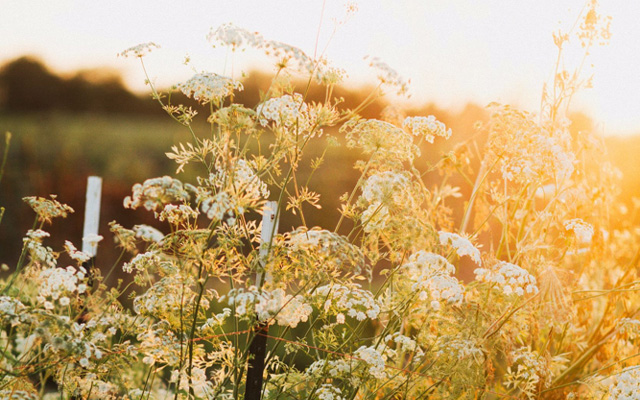 To help with the process, we assembled members of the Floret team, my daughter Elora, a few longtime flower friends, plus two past scholarship recipients to serve on the review committee. This team of 13 people read each and every essay and created a list of 107 finalists. After printing the finalists’ essays, I sat down to read and reread each of their applications in order to try to narrow it down to eight. Selecting the winners is always a heart-wrenching process, as there are always so many deserving applicants. However, this was, hands down, the most difficult decision I’ve had to make in nearly a decade of offering scholarships. There were so many amazing applicants!
To help with the process, we assembled members of the Floret team, my daughter Elora, a few longtime flower friends, plus two past scholarship recipients to serve on the review committee. This team of 13 people read each and every essay and created a list of 107 finalists. After printing the finalists’ essays, I sat down to read and reread each of their applications in order to try to narrow it down to eight. Selecting the winners is always a heart-wrenching process, as there are always so many deserving applicants. However, this was, hands down, the most difficult decision I’ve had to make in nearly a decade of offering scholarships. There were so many amazing applicants!
After deliberating for many hours, we decided that choosing just eight was impossible. After a generous donor came forward to offer a partial scholarship for a grower in her home state, we upped the total to 12 full scholarships.
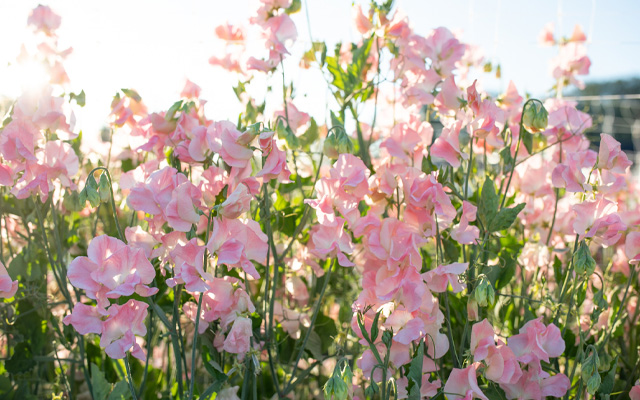 Before I introduce the winners, I want to first express my heartfelt thanks to everyone who took the time to apply. Thank you for sharing your thoughtful essays, family memories, and personal journeys. I am so inspired by the dreams, aspirations, and beautiful life stories that were woven into the essays.
Before I introduce the winners, I want to first express my heartfelt thanks to everyone who took the time to apply. Thank you for sharing your thoughtful essays, family memories, and personal journeys. I am so inspired by the dreams, aspirations, and beautiful life stories that were woven into the essays.
Every year, a few key themes emerge as we read through the applications. This year’s themes reflect the wide-ranging, life-changing events from the past nine months. For example, we know that flowers bring joy; they spark memories and stir nostalgia; they show others we care; they provide comfort during life’s biggest moments and milestones. We’re hungry for more beauty and kindness in our world. I believe this is more true today than ever before.
Specific themes from this year’s essays include:
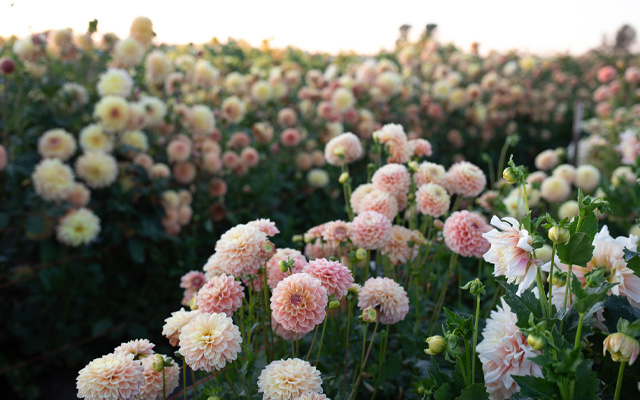 Connecting with others
Connecting with others
Quite a few applicants wrote about the creative ways that flowers help us to connect with loved ones and community members this year in particular.
“I have a grandma who is essentially isolated from family at her care facility due to the current pandemic. I was able to drop off a bucket of homegrown flowers, and the activity coordinator helped the residents make floral arrangements. The pictures I received of my grandma arranging the very flowers I grew is priceless to me—I can’t be there with her in person, but I can be there with her through my flowers.”
“In March, suddenly distanced and isolated, dropping off wildflower bouquets in donated jars from our cultivated patch intended for our bees was a great way to stay connected. It was also a cure for cabin fever and a chance to spread some joy in the process. Soon, “Joy Jars” caught on, and I was taking orders delivering bouquets of summer-loving zinnias and sunflowers all over town! Rarely did I leave a doorstep without getting misty-eyed at the power of this simple gesture.”
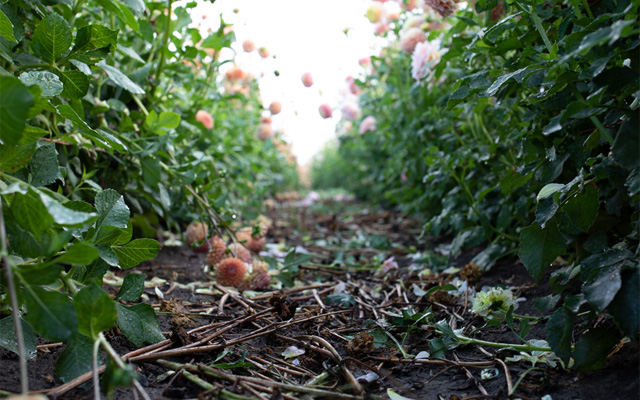 Prioritizing what matters
Prioritizing what matters
There has been a lot of change and disruption over the past year. Whether because of a furlough, an empty nest, an illness, or a new beginning, 2020 forced many applicants to slow down and prioritize what’s really important and what makes us happy.
“Covid-19 hit, and it gave us more time together as a family than I ever thought possible. It made us reprioritize our life and decide what really does matter and what we can put to the side.”
“Since the Covid-19 crisis, the questions I’ve had about my career direction have been heightened—what I am really doing with my life?—and I find my mind keeps wandering back to the garden and an idea I’ve had for a while that seems especially relevant now.”
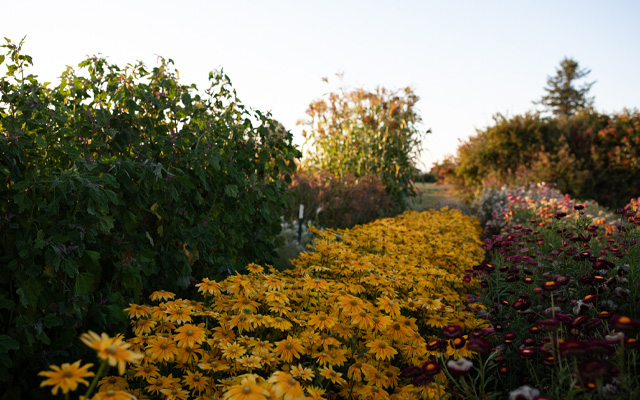 Gardens ground us and calm us
Gardens ground us and calm us
Gardens are magical spaces to retreat from the stresses of everyday life. This has been especially true this past year. So many essays spoke of the therapeutic powers of gardening while dealing with anxiety, illness, and feelings of isolation while being separated from loved ones during the pandemic.
“All worries would disappear when I was in the garden. When flowers started to blossom they were nature’s brightest cheerleaders.”
“With all the upheaval around us, the constancy of the seasons and the life that springs from the garden is calming and good for the soul!”
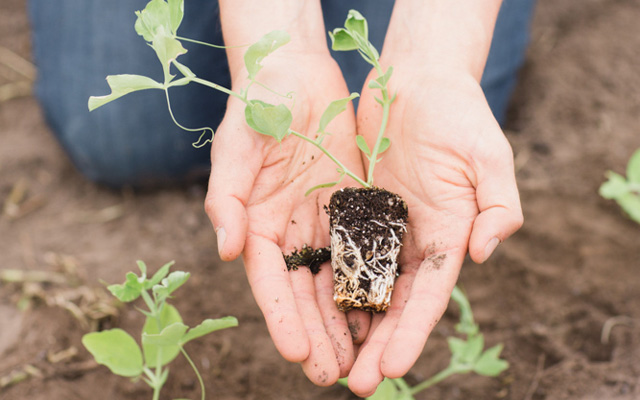 Giving back
Giving back
I’ve said this many times before, but I’m convinced that the flower community is made up of some of the kindest, most generous people on the planet. I am so impressed with the many creative ways in which applicants plan to give back to their community. We noted a strong interest in efforts to support health-care workers, nursing home residents and staff, and populations suffering from depression, post-traumatic stress, and other mental health issues.
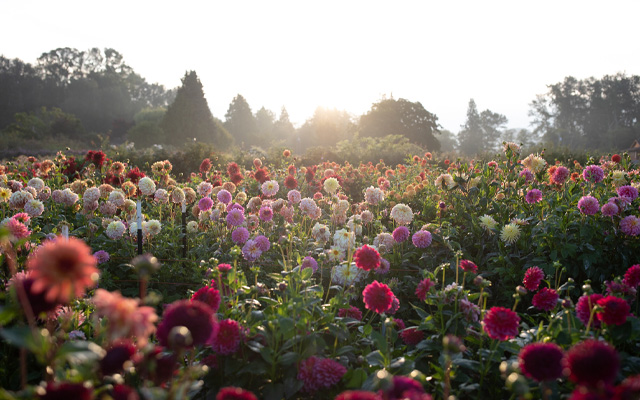 Hope and perseverance
Hope and perseverance
Finally, the stories of determination and perseverance of countless refugees, immigrants, and families displaced by devastating wildfires, hurricanes, and other natural disasters were so striking and humbling. These stories have stayed with me and motivated me to do more.
“When my parents left [Laos] they were only allowed to carry one plastic bag to start their life in America, and in that bag my father brought seeds.”
Without further ado, I’m honored to introduce the 2021 Floret Scholarship awardees.
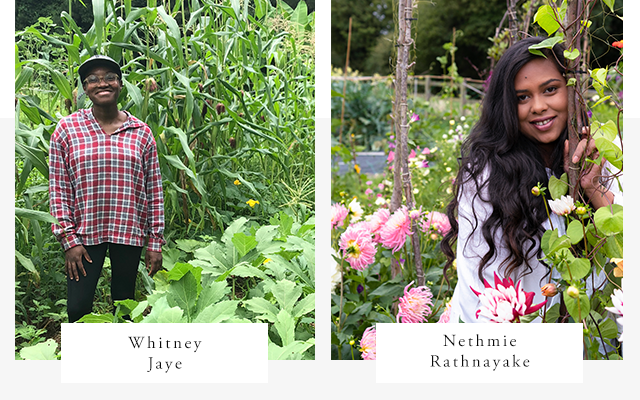 Whitney Jaye, Semente Farm, Lithonia, Georgia, United States
Whitney Jaye, Semente Farm, Lithonia, Georgia, United States
In 2017, Whitney Jaye started Semente Farm with the mission to supply the surrounding community with local, sustainably grown produce, flowers, and herbs. The flower portion of the business began as a passion project but has grown to become the only Black-owned local flower supplier in the Atlanta area.
“There has been a heightened demand for our offerings, and we are only just beginning to figure out how to keep up. In the last year, we’ve launched a crowd-raising campaign to build adequate cold storage in our farm barn, the last big key to being able to grow our business. With a little more training on flower production and business planning, we hope to expand our offerings. Next season, my goal is to grow a wider variety of flowers and to upgrade our marketing to best reach potential buyers. The workshop will help me accomplish my goals by providing me with invaluable insights as I seek to optimize our production, grow more flowers, and get them into the hands of more people.”
Nethmie Rathnayake, Arlesey, England, United Kingdom
Nethmie Rathnayake’s story begins in Sri Lanka, where she grew up in the middle of a forest planted by her grandparents and six generations of ancestors. As a child, Nethmie spent many mornings alongside her grandmother, transplanting and harvesting flowers to donate to poor couples for weddings. But the violence of the Sri Lankan civil war changed everything.
“My parents realised we could not live in constant fear, so we sold our forest home with generations of family history and emigrated to England. I felt incredibly fortunate to have escaped from the war, but living in a small flat, unable to feel the healing magic of blooming flowers, the magic of my soul too, disappeared.
“Then, everything suddenly changed when I received my allotment plot. I started digging and planting my cut flower garden till dusk after work. I was exhausted, but the thought of growing my own flowers again kept me going. People in our village started to thank me for creating a place they could walk past and feel uplifted. My fellow villagers gifted seeds and gardening tools to me when I could not afford any. Our village farmer offered me an acre of his land to grow flowers, and our local shop owner offered me a stand outside his shop to sell my bouquets. I am truly blessed to have a kind community that has cheered me on in my flower journey. Even with all this support, I stand frozen in fear of letting them down, as I do not have any knowledge of how to run a flower farm. My hope is to give my future children the childhood of unconditional healing love I felt growing up surrounded by flowers. The workshop is my hope for a better life.”
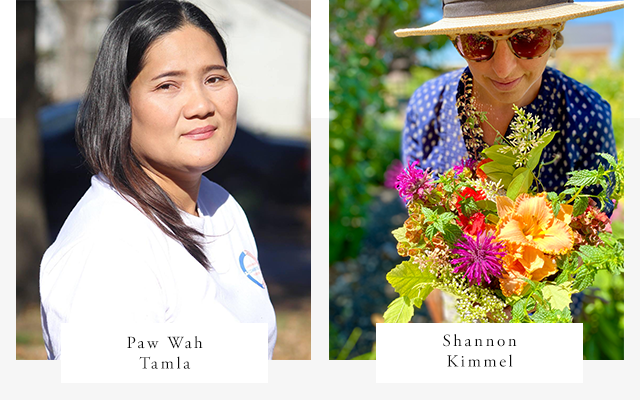 Paw Wah Tamla, Ki Koko Farm, Kansas City, Kansas, United States
Paw Wah Tamla, Ki Koko Farm, Kansas City, Kansas, United States
Originally from Burma/Myanmar, Paw Wah Tamla came to the United States in 2008 as a Karen refugee from Umphiem Mai camp in Thailand. After settling in the Kansas City area, Paw Wah and her family joined the New Roots for Refugees program, a partnership between Cultivate KC and Catholic Charities of Northeast Kansas. The program trains refugees with agricultural experience to become independent farmers and small business owners. As part of their training, Paw Wah and her family created Ki Koko farm, which means “two sisters,” and started selling produce at a farmers markets in Kansas City.
“After selling at the market for several years, my family realized that flowers are in high demand,” Paw wrote. “In 2019 I became the CSA specialist for the New Roots program. Now, we have 17 farmers in the program, and we help them achieve self-sufficiency. If I receive this scholarship, it will help my family flower business, but it will also help New Roots farmers, because I plan to share my knowledge with farmers who are interested in selling flowers.”
Shannon Kimmel, Plant Stamp, Boise, Idaho, United States
Over the years, we’ve received a few applications submitted by friends and family on behalf of some very special people. We don’t normally consider these types of submissions, but after reading a beautiful letter by a friend of Shannon Kimmel, I knew she had to receive this opportunity.
“Shannon has dreamed of taking a Floret course but cannot afford it. She would say others deserve this scholarship more than her, but she has made more sacrifices than most people,” her friend wrote. “She is the mother of two boys, 15 and 11, her youngest is a special needs child with Williams Syndrome. He is thriving because of Shannon. Following the diagnosis, Shannon quit her full-time job to be home with him. She made a significant amount more than her husband, but decided her child needed a full-time mom at home. This required that her family stick to a very strict budget, which included only one car, and buying secondhand. It also meant that she had to put her own career and school on hold for years.”
Shannon started a business growing and selling flowers this year and has plans to give back to her community by donating flowers and teaching kids and refugees how to grow flowers through her volunteer work with the local community garden.
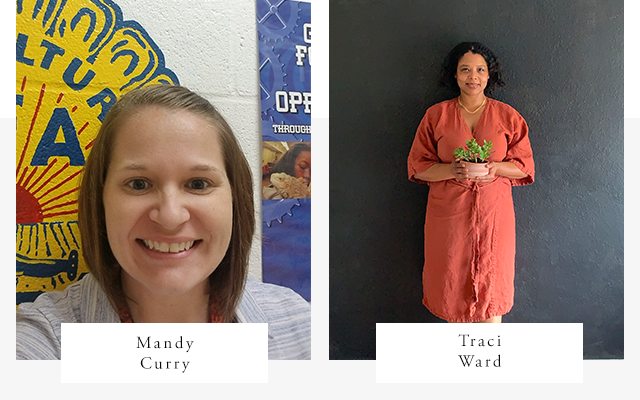 Mandy Curry, Central High School, Woodstock, Virginia, United States
Mandy Curry, Central High School, Woodstock, Virginia, United States
Mandy Curry is an agriculture teacher at Central High School, which is located in the heart of Virginia’s Shenandoah Valley. Eager to provide her students with hands-on learning opportunities, Mandy started teaching her students about cut flowers and launched a floral subscription program.
“While all flowers are beautiful, I want my students to become familiar with something beyond inexpensive bulk flowers like carnations and alstroemeria. I love learning, I love plants, and I love sharing these experiences with my students. It’s really gratifying to see their love for plants develop over a semester. I love seeing the excitement in their eyes when they see the transformation that a tiny seed makes, from first being planted to a small seedling, and finally having flowers. By participating in this workshop, I’d be able to gain the knowledge and planning skills to start cut flower beds at school. These flower beds would be built, planted, and maintained by myself and my students. Flowers grown would be used for educational purposes and sold to help us grow and maintain our program.”
Traci Ward, Plant + Vessel, Austin, Texas, United States
The day after enrolling in an evening pottery class, Traci Ward learned from her boss that her position was dissolved. Viewing it as serendipitous instead of a setback, she poured herself into her newfound passion and started creating her own line of vases and planters, called Plant + Vessel. Eager to add the “plant” to her “vessel,” Traci later enrolled in a floral design class.
“We learned about sourcing flowers, and the ecological footprint concerned me. I considered a cutting garden but was living in a shared apartment with no land,” she wrote.
When Covid-19 hit, Traci knew she needed more space for herself and her daughter’s online learning. She hurriedly found and settled into a new rental house, which features a 1/5-acre backyard, where she plans to grow flowers for her business.
“I don’t know where to start—but Floret does. This scholarship will allow my daughter and me to attend the workshops, work on our garden, and enrich her life skills while I grow Plant + Vessel by creating a steady income by incorporating florals. I’ve taken practical steps to start my solopreneurship and am thrilled by the possibilities because farming is the missing piece to Plant + Vessel. The Floret Workshop will allow me to continue my education while I’m at home, working on my pottery, starting a cutting garden, and raising my daughter.”
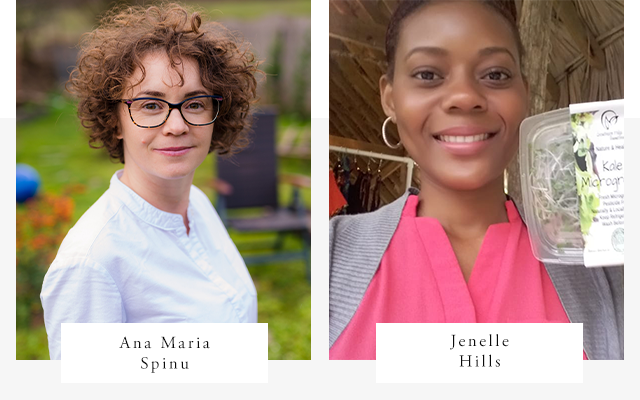 Ana Maria Spinu, Bologna, Emilia-Romagna, Italy
Ana Maria Spinu, Bologna, Emilia-Romagna, Italy
In Bologna, Italy, flower shops dot the city, yet local flower farms are rare. The city promotes a “Zero kilometer” initiative that encourages Italians to shop locally for vegetables, cheese, and meat. Ana Maria Spinu’s dream is to offer “Zero kilometer flowers” grown locally and in harmony with nature.
Ana grew up in Romania in the 1980s under a repressive Communist regime that confiscated food crops from farmers. Her resourceful grandmother helped support her family by growing and gathering food (and flowers) and has inspired her to pursue her passion.
Ana plans to share a portion of the flowers she grows with the large elderly population in her community, especially those that have been isolated this year, so that she can “bring the joy of flowers to someone’s grandparent, just like my grandma did for me years ago.”
Jenelle Hills, Life Blooms, South Trinidad and Tobago
Two years ago, Jenelle Hills’ microgreen business changed course after a chef requested edible flowers along with the restaurant’s order of kale, shoots, and baby salad mix. At the time, Jenelle admits she “had no idea edible flowers existed, so I did some research, and that started my flower farming journey.”
Life Blooms now grows and sells edible flowers alongside produce and will be one of the first flower farms in Trinidad and Tobago to sell fresh-cut, locally grown flowers. Trinidad currently imports 90 percent of its fresh flowers, however, there is a growing demand for local alternatives, especially in the wedding industry.
“I want to be the very first female flower farmer in my country growing beautiful flowers for weddings, florists, and farmers markets. Although farming in a male-dominated sector comes with numerous challenges, I am motivated to create change in my community by creating jobs, training Black women, and spreading the happiness and love flowers have given me.”
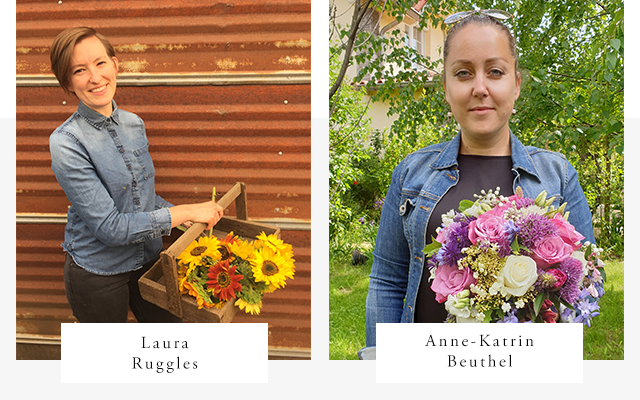 Laura Ruggles, Salem, Oregon, United States
Laura Ruggles, Salem, Oregon, United States
Laura Ruggles grew up in a farming family in Oregon’s Willamette Valley. Three years ago, at age 25, she unexpectedly lost both her dad and grandpa, and became the legal guardian to her then 94-year-old grandma. Soon after moving her grandmother to an assisted living facility, she began planting flowers in her yard so she could bring her bouquets. Each bouquet stirred old memories and initiated meaningful conversations. Other residents would stop Laura in the hallway to examine them, sharing their own flower memories.
To pay for her grandma’s care, Laura has had to sell all but a few acres of her family’s farm. Despite feeling that she had somehow let her grandma down, she was determined to find a way to successfully farm the small plot of land she was able to hold on to—continuing her family’s tradition since 1850. When she discovered cut flower farming a light bulb went off, and she realized it was everything she was looking for.
Laura’s dream is to start a bouquet subscription service for seniors. “I am now the sixth generation to live on this land,” she wrote. “I have big dreams of growing healthy, beautiful blooms I can share with Grandma and others in their sunset years. I’ve seen how a bouquet can bring such joy to a senior. I hope to build a strong foundation with education so that I have the best possible chance at success—and so that the inevitable trials won’t be earth-shattering.”
Anne-Katrin Beuthel, Wild Flower Studio, Barilevë, Kosovo
Anne-Katrin Beuthel started a small, organic flower farm in Barilevë, Kosovo, five years ago, where she employs young girls and women who would otherwise have difficulty finding a job. After the curveballs 2020 has thrown, she realized she needs more than just her passion for growing flowers to sustain her business. Anne intends to use the Floret Online Workshop to diversify her sales outlets and further grow her business. She also wants to use this opportunity to bring more attention to the benefits of organic farming in her region, where sustainable practices aren’t commonplace. “I also hope to find the support of your amazing community,” she said. “I don’t have one here, where I am the only flower farmer in the country.”
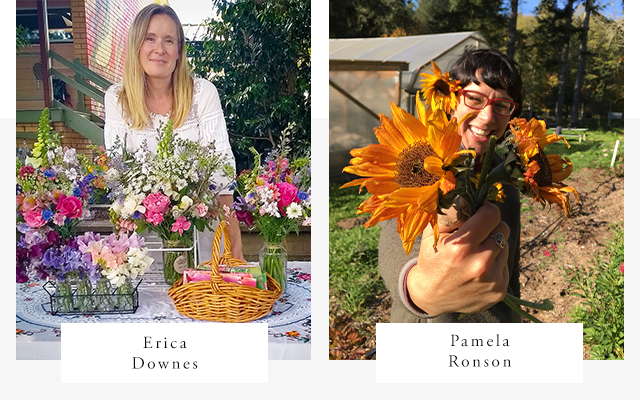 Erica Downes, Little House on the Dairy, Jamberoo, New South Wales, Australia
Erica Downes, Little House on the Dairy, Jamberoo, New South Wales, Australia
Erica Downes has built a small yet thriving flower business on her family’s dairy farm in New South Wales, Australia. In recent years, the dairy farming industry has faced many challenges. With three young children at home, Erica decided to begin growing and selling flowers to help contribute financially. The support of her community has been overwhelming, and a few years into growing, she’s finding it difficult to keep up with demand. “It’s a wonderful yet frustrating problem to have!” she wrote. “Flowers are my love letter to my town. I need to grow. I have ideas and endless enthusiasm; I need help to make them reality.”
Erica is passionate about offering beautiful, seasonal, local flowers as an alternative for her community and intends to extend her growing season to get more from her patch of land, streamline her processes, be more organized in her sowing schedule, and further develop her floristry skills. “To have the weight and experience of the Floret workshop behind me would add professional gravity to what I am trying to present and achieve.”
Pamela Ronson, Detroit, Michigan, United States
After working for 10 years as an urban farmhand, Pamela Ronson finally realized it was time to become who she was always destined to be: a flower farmer. “Since I was 8 years old, I’ve cherished one thing most: the refreshing, deep-sinking feel of my bare feet in the squishy, cool, mud while watering the violet pansies in my mother’s garden.”
Access to sovereignty is Pamela’s vision for her highly efficient small-scale farm. She believes the Detroit market has untapped potential and opportunity for native flower sales, and sees the communal impact of educating customers about native flowers and seed-saving banks— incentivizing local residents to support a local, sustainable, urban ag economy. “Many Detroiters lack access to capital and express the desire of growing their own food and flowers on a small budget,” she wrote. “By investing in me, you empower a whole city.”
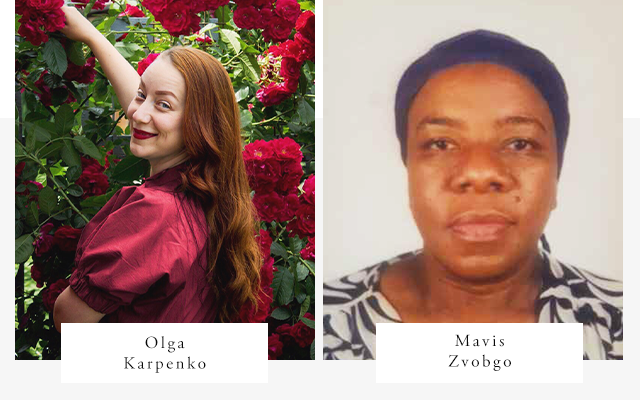 Olga Karpenko, Druzhilovichi, Belarus
Olga Karpenko, Druzhilovichi, Belarus
After 15 years of working in an intense marketing job, Olga Karpenko discovered growing flowers as a way of dealing with overwork and stress. She started her first seed-grown pompon dahlia on the bathroom floor of her rented 26-square-meter studio flat in Minsk. Recent political unrest in the capital forced Olga and her family to move to the relative safety of the countryside, where she plans to transform her small plot into one of the country’s first seasonal cut flower farms.
Her dream is “to make a living doing something beautiful and reconnect with nature after years in a grey, post-Soviet city. The official symbol of my land is a simple blue cornflower growing wild among golden wheat fields. I wish I could see not only foreign flowers, but bunches of multicoloured cornflowers in every local flower shop.”
As the political crisis in Belarus deepens and wages stagnate (the average salary in her region is just 350 USD), a Floret scholarship would “be an invaluable contribution to me and to flower farming in my country,” she wrote.
Mavis Zvobgo, Masvingo, Zimbabwe
Mavis Zvobgo and her husband inherited a small farm near Masvingo, Zimbabwe, where they have been toiling to make ends meet. Mavis plans to start a flower business to help earn extra money to pay for the school fees for her two children. Inspired by the garden her mother tended, Mavis’s goal is to become the first grower-supplier in her community catering to weddings, funerals, and various special events. “Flowers were made to beautify this difficult world,” she wrote.
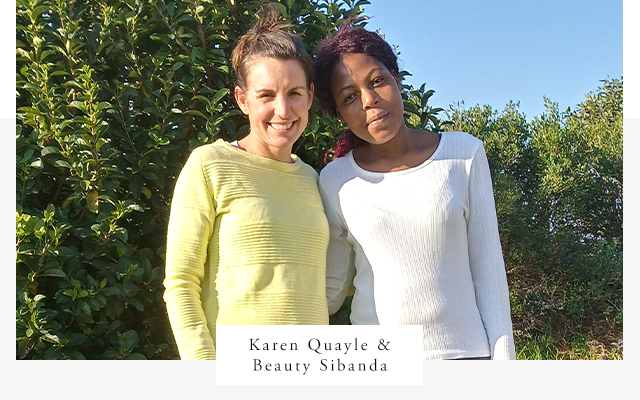 Karen Quayle and Beauty Sibanda, Greyton, South Africa
Karen Quayle and Beauty Sibanda, Greyton, South Africa
Karen Quayle lives with her husband and young family on a farm in the Overberg in South Africa, where they raise angora goats and plan to expand into cut flowers. Beauty Sibanda is an integral part of their team and family on the farm, Spinlea.
Their dream is to complete the Floret workshop so that they can create something together that will give Beauty a second chance in life and an opportunity to learn, grow and provide for her extended family, through her green fingers. We need this to work and last so that we can provide the greater community with much-needed joy, and to inspire hope where there is so much adversity. Also, many people have lost hope in our country, and my husband and I want to show our team that farming is worth it, worth hoping and working for something better. To inspire positivity.”
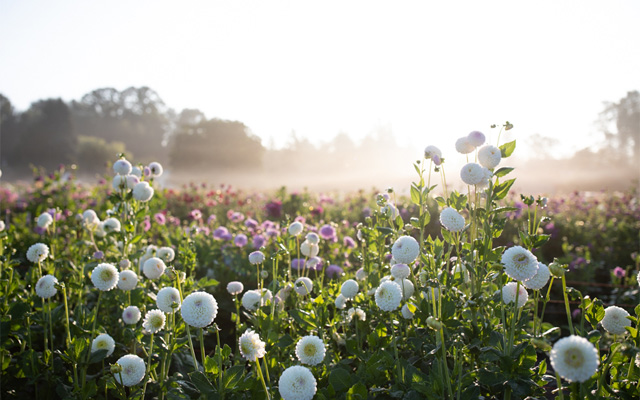 Reading the winners’ excited and grateful responses has been such a thrill. What is especially meaningful is that many have committed to also pay it forward and give back to their communities in some way. My dream is for this spirit of giving to continue to grow and bring even more beauty into the world.
Reading the winners’ excited and grateful responses has been such a thrill. What is especially meaningful is that many have committed to also pay it forward and give back to their communities in some way. My dream is for this spirit of giving to continue to grow and bring even more beauty into the world.
Please join me in congratulating the 2021 Floret Scholarship winners. All of us here at Floret are so thrilled to have this group join us for the upcoming Floret Online Workshop.
If participating in the Floret Workshop is on your bucket list, you’ll want to sign up for our waitlist to be notified of the next registration period. Enrollment to the 2022 Floret Online Workshop will be open for just one short week in the fall of 2021.

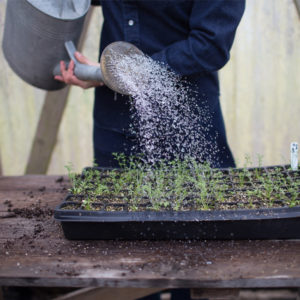
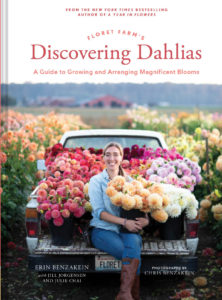
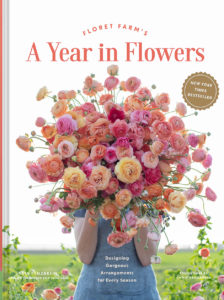
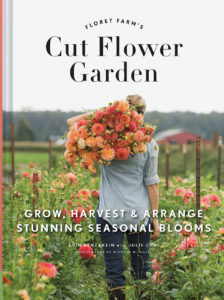

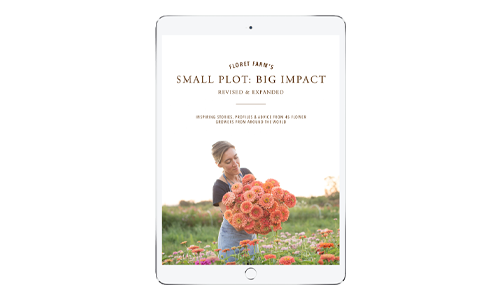
Sara on
Awesome congrats to all winners. And all participants for making a commitment.
It is so exciting to see the vast array of people and locations that are interested in growing flowers. I would very much love to hear how the stories develop, and learn along with them.
Floret Team – Any thought to putting this in a TV series?… I am sure it would be a total invasion of the privacy of participants’ gardens, but think of the beauty, ideas, inspiration and hope that would be shared.